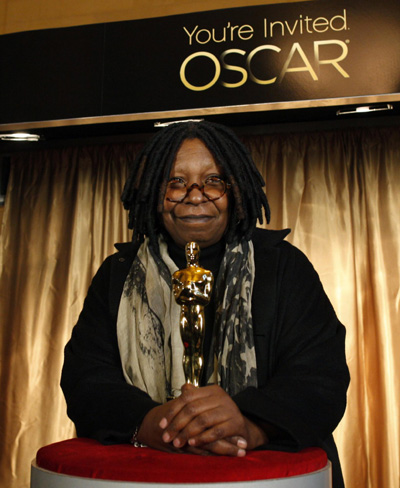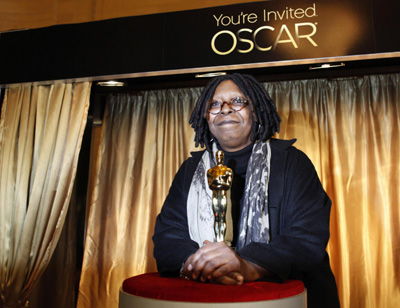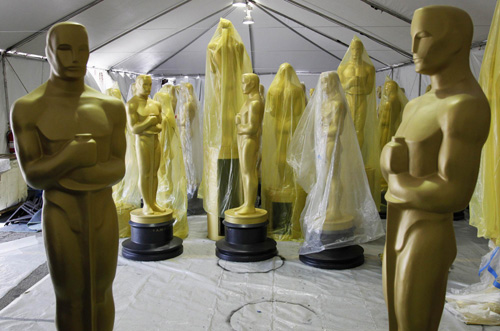Movies
Oscar is golden, but film business shows some tarnish
Updated: 2011-02-24 13:52
(Agencies)
 |
|
Actress Whoopi Goldberg poses with an Oscar statuette at the "Meet the Oscars" exhibit at Grand Central Station in New York February 23, 2011.[Photo/Agencies] |
 |
|
Actress Whoopi Goldberg poses with an Oscar statuette at the "Meet the Oscars" exhibit at Grand Central Station in New York February 23, 2011.[Photo/Agencies] |
 |
|
Oscar statues are seen stored in a tent during preparations for the 83rd annual Academy Awards in Hollywood, February 23, 2011.[Photo/Agencies] |
'ARE STUDIOS DEAD?'
Jeffrey Korchek, vice president of legal and business affairs at Mattel Inc, recently wrote an opinion piece for The Huffington Post titled "Are Studios Dead?" in which he argued movies are becoming low-value commodities because companies such as Netflix and Coinstar's Redbox make renting so cheap.
Redbox rents movies for $1 a day at kiosks, a price studios grumble about, and Netflix, with some 20 million subscribers, lets consumers stream all the movies they want for $7.99. Amazon.com this week rolled out a streaming movie service for customers who pay $79 a year for free shipping on other items.
Overall spending in home entertainment rentals has declined to $6.3 billion last year from $8.6 billion in 2001, according to IHS Screen Digest.
"Where is the movie business' Steve Jobs, the person who knows what people want to see before they do, knows that giving content away for free on the Internet isn't such a good idea and who creates excitement, brand loyalty and an enduring corporate culture?" Korchek wrote.
But if there is no single superhero leading the industry, the studios are taking some steps to secure the future.
They have invested in 3D and looked at ways consumers can receive movies in homes faster, as well as created systems for selling digital copies of films directly to customers.
There are now 8,455 screens with 3D technology in the United States, accounting for over 20 percent of all screens, according to the National Association of Theater Owners.
Thanks in part to higher ticket prices of $3 or more, 3D movies could account for 30 percent of box office results in 2011, said Eric Wold, an analyst with Merriman Curham Ford.
But already there are signs of weakening in the 3D market, and Matthew Lieberman, a director in PricewaterhouseCoopers' entertainment division, said consumers are becoming more thoughtful in choosing which films they want to see in 3D.
"The ability to maintain that price premium is definitely a point of concern," Lieberman said.
Elsewhere, several Hollywood studios this year will roll out a system called Ultraviolet, which will allow consumers to register a movie purchased online so they can stream the film through laptops, Blu-ray players and any future device.
"We anticipate a lot of consumers signing up for Ultraviolet," said Sony's Singer, who oversees Ultraviolet. He added that the overall market for digital downloads of movies and TV shows could grow to $480 million this year.
But compared to the billions of dollars Hollywood is accustomed to raking in from movies, that figure looks far less than golden -- the color of an Oscar.
E-paper

Chinese tourists as top shoppers
Since last summer, Chinese tourists emerged as the top tax-free shoppers in Europe.
Golden run ahead
Looking abroad
Mapping out a plan
Specials

The green lantern
Environmental concerns are shedding new light on a colorful tradition

Inland interchange
Chongqing bets on its position as a hub for China's west.

Zooming in on Chinese skies
Helicopter companies ride on country's growing interest in luxury aviation.
